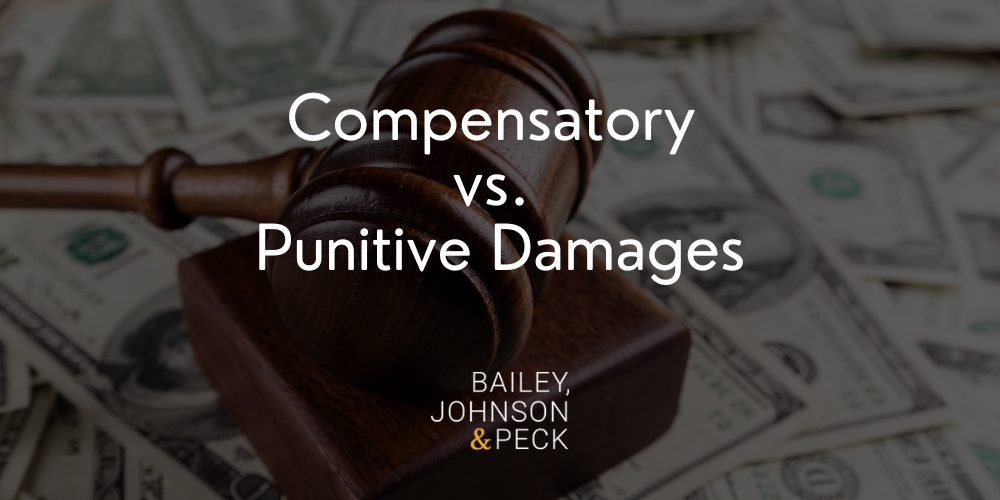Compensatory and punitive damages are two categories of compensation plaintiffs can be awarded in a personal injury claim. But what is the difference between compensatory vs punitive damages in such cases? Compensatory and punitive damages serve distinctly different purposes. Compensatory damages, or actual damages, aim to reimburse the victim of a tragic accident for their losses, while a judge may award punitive damages, or exemplary damages, to penalize the at-fault party for gross negligence and deter future misconduct. Understanding the differences between compensatory vs punitive damages is crucial when filing your personal injury claim.
Here, the Albany personal injury attorneys at Bailey, Johnson & Peck explain compensatory and punitive damages to help ensure victims understand whether or not they’re getting a fair settlement from their personal injury case.
If you’ve been injured by someone else’s negligence, may have grounds to file a claim in civil court and obtain fair compensation. Call our experienced Albany catastrophic injury attorneys at 518-456-0082 to schedule your free consultation today.
What Are Compensatory Damages in a Personal Injury Claim?
Compensatory damages in a personal injury claim – also known as actual damages – are designed to financially restore the victim to the position they were in prior to the accident caused by negligence. Compensatory damage awards cover a wide array of losses, both tangible and intangible.
Tangible, or economic, losses include clear financial expenditures such as medical bills for medical expenses related to the injury, rehabilitation costs, lost wages, and the repair or replacement of property damage.
Intangible or subjective losses encompass the more intangible aspects, such as pain and suffering, emotional distress, shortened life expectancy, loss of consortium, and diminished quality of life.
The goal of compensatory damage awards is to provide monetary compensation to account for the impact on the victim’s life.
Actual damages can be broken down even further. The most common compensatory damages are general damages and special damages.

What are the Two Types of Compensatory Damages?
General Damages
General damages in the realm of personal injury law are intended to compensate victims for the non-economic losses that don’t have a direct monetary value but significantly impact their quality of life. These non-economic damages are meant to acknowledge that the physical pain and suffering extends beyond mere financial costs.
Common types of general damages that an injured party could recover include:
- Physical pain and suffering
- Emotional distress
- Loss of enjoyment of life
- Scarring and disfigurement
- Loss of consortium
- Permanent disability
General damages serve to acknowledge and compensate for subjective losses.
Special Damages
Special damages are awarded to cover the economic losses that can be directly quantified and attributed to the incident. Special damages are designed to reimburse the victim for the financial losses the accident caused. Unlike general damages, which address the intangible losses, special damages focus solely on the economic fallout.
Common types of economic damages include:
- Medical expenses: Covers both past medical expenses and future expenses for medical care after an injury, including medical bills for hospital stays, surgeries, physical therapy, mental health counseling, mobility or assistive devices, and medications.
- Home modifications and caregiving costs: Costs associated with adapting the living environment to accommodate permanent disabilities resulting from the incident.
- Lost wages: Compensation for income lost due to the inability to work temporarily or permanently because of the injury.
- Property damage: Costs for repairing or replacing the personal property damage caused by the accident or injury.
- Any other actual expenses associated with the incident
By addressing these specific financial impacts, special damages play a crucial role in the victim’s recovery process.
When Are Compensatory Damages Awarded?
Compensatory damages are awarded in personal injury cases when the civil court finds the plaintiff has suffered losses due to another person’s negligence.
A plaintiff can recover compensatory damages in a variety of personal injury claims, including:
- Motor vehicle accidents, where severe injuries and wrongful death result from collisions or other vehicular incidents. Our Albany car accident attorneys and Albany truck accident attorneys have more than 40 years of experience in helping injured victims recover compensatory damages from an accident caused by the guilty party.
- Medical malpractice cases, where harm is caused by the negligence of healthcare professionals. Our Albany medical malpractice attorneys can help victims recover full compensation for a variety of negligent acts, such as diagnostic errors, chiropractic errors, epidural errors, and more through medical malpractice cases.
- Birth injury cases, which involve injuries to a newborn due to medical negligence. If your newborn has suffered major injuries or long-term disability from a negligent medical professional, don’t hesitate to reach out to Albany birth injury attorneys at Bailey, Johnson & Peck.
- Premises liability cases, where injuries occur on someone else’s property due to unsafe conditions. If you slip and fall due to unsafe conditions and you suffer major injuries as a result, contact an Albany premises liability attorney to help you file a slip and fall lawsuit in New York.
- Nursing home abuse and neglect cases often result in compensatory damages for victims, covering medical bills, pain and suffering, and emotional distress. Our Albany nursing home abuse lawyers help families secure compensation for the harm caused by inadequate care or abuse in nursing facilities.
The personal injury attorney team at Bailey, Johnson & Peck, P.C. possess a deep understanding of compensatory vs punitive damages and can help ensure victims are justly compensated for their losses, helping them to navigate the legal system effectively and secure the monetary award they are entitled to.
Are Compensatory Damages Taxable?
The taxability of compensatory damage awards depends on what the damages are intended to compensate for:
- Damages received for physical injuries are generally not taxable. This includes amounts received for medical expenses and pain and suffering if it stems directly from the injuries.
- Reimbursements for medical costs related to emotional distress or mental anguish that are not due to physical injuries are taxable.
- Reimbursement received for lost wages are taxable as they replace lost wages that would have been taxed if earned normally.
- If property damage awards exceed the adjusted basis of the property, the excess is taxable as a capital gain. However, if the damages merely restore the property to its previous condition, they are generally not taxable.
*These are general statements, not meant to establish an attorney-client relationship.

What Are Punitive Damages?
Unlike compensatory damages, which cover actual losses, punitive damages are intended to punish the defendant for particularly egregious, reckless, or malicious behavior and to deter similar wrongful behavior in the future. Punitive damages, also known as exemplary damages, are not tied to the victim’s direct losses but are awarded in addition to compensatory damages as a form of punishment when the defendant’s negligent behavior is found to be especially harmful or conducted with a blatant disregard for the safety of others.
Punitive damage awards are paid more sparingly and typically require a higher standard of proof, such as clear and convincing evidence of the defendant’s gross negligence, bad faith, intentional misconduct, or illegal actions.
If your personal injury case involves grossly negligent action, our personal injury lawyers will gather evidence to prove injuries were the result of such.
When Are Punitive Damages Awarded?
Punitive damages are awarded to an injured victim in cases where the court finds the defendant’s conduct as willfully negligent, malicious, fraudulent, or in reckless disregard for others’ safety. In order for a court to award punitive damages to a victim, they must provide substantial physical evidence of the defendant’s egregious conduct and meet a higher standard of proof.
Are Punitive Damages Taxable?
Punitive damages are generally taxable. According to the IRS, punitive damages are considered taxable income unless specifically exempted by the tax code. Punitive damages are intended to punish the defendant for particularly harmful behavior rather than to compensate the victim for a loss. Because they are not tied to physical injuries, they are treated as taxable income.
What is the Difference Between Compensatory Damages and Punitive Damages?
The primary distinction between compensatory vs punitive damages lies in their purpose: compensatory damages aim to restore the victim’s financial state, while punitive damages seek to punish the defendant for grossly negligent behavior and deter similar behavior in the future.
Compensatory damage awards are tied to the victim’s actual losses, whereas punitive damages are related to the defendant’s behavior.

Can You Recover Compensatory and Punitive Damages at the Same Time in New York?
Recovering both compensatory and punitive damages in personal injury claims is possible but typically reserved for cases with exceptionally egregious defendant negligence. Compensatory damages aim to cover both tangible and intangible losses, whereas punitive damages, less commonly awarded, are for cases showing gross disregard for safety or malicious intent. The threshold for punitive damages is high, requiring clear proof of reprehensible behavior.
An experienced personal injury attorney in Albany, NY, can assess the potential to claim both types of damages in your case. Leveraging their legal expertise, they can navigate the complex legal system to secure the most comprehensive compensation possible, including pursuing punitive damages when applicable.
Experienced Personal Injury Attorneys in Albany, NY
If you or a loved one has been injured due to someone else’s negligence in Albany, NY, it’s crucial to hire an experienced attorney in Albany, NY, to navigate the complexities of your personal injury claim. The legal team at Bailey, Johnson & Peck, P.C. is dedicated to advocating for your rights and ensuring you receive the compensation you deserve. With 40 years of experience in handling a wide array of personal injury cases, from car accidents to medical malpractice, our team is committed to delivering personalized and effective legal solutions.
Don’t navigate your personal injury lawsuit alone. Call Bailey, Johnson & Peck today at 518-456-0082 to schedule a free consultation and learn more about how we can assist you in your pursuit of justice and recovery.




